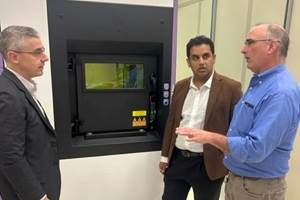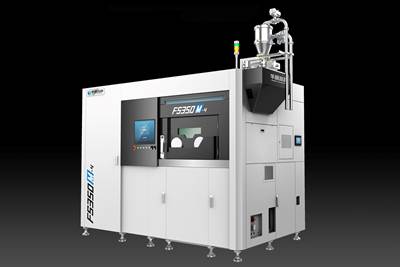Beehive Industries Awarded $12.4M Defense Contract for 30 3D Printed Jet Engines
The aim of Beehive’s project is to demonstrate the value of its additive manufacturing methods to produce engines faster and more affordably without compromising performance.
Share
Read Next
Beehive Industries, an American manufacturing company specializing in jet propulsion for uncrewed aerial defense applications, has been awarded a $12.46-million contract to collaborate on the development and production of low-cost small expendable turbine (SET) engines with the University of Dayton Research Institute (UDRI) and the Air Force Rapid Sustainment Office, Wright-Patterson Air Force Base.
The contract is to develop a 200-lb. thrust class engine using additive manufacturing (AM) methods, including the design, manufacture, testing and qualification of the engine, which includes demonstrating manufacturing scalability, completion of flight testing and an initial production run of 30 engines. The program is to be completed within 24 months with work taking place in Beehive’s Cincinnati, Ohio; Denver, Colorado; and Knoxville, Tennessee, facilities.
The development of this 200-lb. thrust engine is designed to demonstrate the merit of Beehive’s AM methods to produce engines faster and more affordably without compromising performance. Also, the engine will have a variety of uncrewed applications, including drones, standoff systems and collaborative combat aircraft. This contract is the latest achievement for this manufacturing startup, including the development and testing of its 500-lb. demonstrator and the expansion of its facilities in Knoxville, Denver and Cincinnati.
Earlier this year, Beehive announced the successful test completion of the 500-lb. thrust engine as part of its strategy to develop a family of engines ranging from 100 to 5,000 lbs. of thrust for a variety of applications. This latest program will enable Beehive to build on that success and apply its additively-enabled design and manufacturing processes directly in support of the need for capable, affordable and readily available propulsion systems.
“Beehive is excited to have this opportunity to bring its capabilities to bear on the affordable mass challenge for the U.S. military in collaboration with the University of Dayton Research Institute,” says Gordie Follin, Beehive’s chief product officer. “Our state-of-the-art additive manufacturing approach opens up new possibilities to radically alter the traditional relationships between cost, performance and scalability while delivering high-performance engines purpose built for their applications.”
Brian Stitt, division head for Sustainment Technologies Transition at UDRI, says the Research Institute team is excited to be in partnership with the U.S. Air Force Rapid Sustainment Office and Beehive Industries to progress AM in the aerospace and propulsion fields. “This partnership will not only propel the Air Force but the additive industry as a whole, and we are proud to be a major part of it!” Stitt says.
Beehive Industries is a U.S.-based manufacturing company specializing in the design and development of jet engines for uncrewed aerial defense applications as well as parts manufacturing across high technology industries. Beehive employs more than 200 people and says it is committed to powering American defense through advanced manufacturing and innovative offerings.
The UDRI focuses on the research, development and field transition of new and emerging technologies. It works with partners to elevate innovation. The Air Force Rapid Sustainment Office (RSO), a Division of the Air Force Life Cycle Management Center Combat Readiness Directorate, aims to accelerate game-changing capabilities that sustain a modern Air Force. By utilizing new and emerging technologies, the RSO develops sustainment and maintenance solutions to maximize warfighter readiness.
Related Content
Additive Manufacturing for Defense: Targeting Qualification
Targeting qualification in additive manufacturing for the defense industry means ensuring repeatability as well as reliability as there is much at stake, including human lives. Certain requirements therefore must be met by weapons systems used by the defense industry.
Read MoreNew Zeda Additive Manufacturing Factory in Ohio Will Serve Medical, Military and Aerospace Production
Site providing laser powder bed fusion as well as machining and other postprocessing will open in late 2023, and will employ over 100. Chief technology officer Greg Morris sees economic and personnel advantages of serving different markets from a single AM facility.
Read MoreBig Metal Additive: The Difference Between a Shape and a Part Is Quality
Preparing to scale directed energy deposition to ongoing full production is not a technological challenge: DED is ready. But it is an organizational challenge, says the company founder. Here is what it means to implement a quality system.
Read MoreFor Coast Guard, AM Adoption Begins With “MacGyver-ish” Crew Members Who Are Using 3D Printing Already
AM suits the Coast Guard’s culture of shipboard problem-solving, says Surface Fleet AM lead. Here is how 3D printers on ships promise to deliver not just substantial cost savings but also an aid to crew capabilities and morale.
Read MoreRead Next
Bike Manufacturer Uses Additive Manufacturing to Create Lighter, More Complex, Customized Parts
Titanium bike frame manufacturer Hanglun Technology mixes precision casting with 3D printing to create bikes that offer increased speed and reduced turbulence during long-distance rides, offering a smoother, faster and more efficient cycling experience.
Read MoreCrushable Lattices: The Lightweight Structures That Will Protect an Interplanetary Payload
NASA uses laser powder bed fusion plus chemical etching to create the lattice forms engineered to keep Mars rocks safe during a crash landing on Earth.
Read MoreProfilometry-Based Indentation Plastometry (PIP) as an Alternative to Standard Tensile Testing
UK-based Plastometrex offers a benchtop testing device utilizing PIP to quickly and easily analyze the yield strength, tensile strength and uniform elongation of samples and even printed parts. The solution is particularly useful for additive manufacturing.
Read More





















